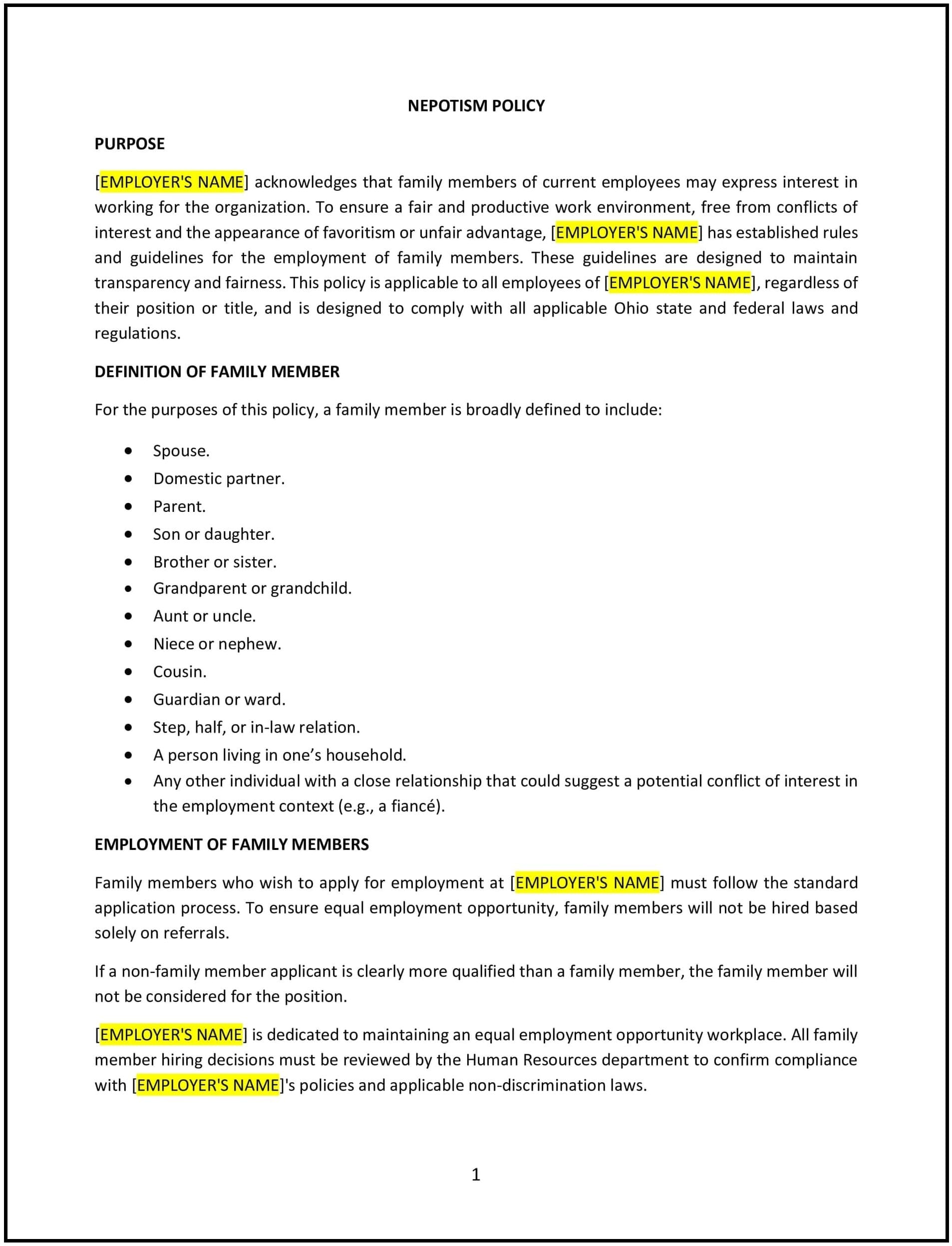Got contracts to review? While you're here for policies, let Cobrief make contract review effortless—start your free review now.

Customize this template for free
Nepotism policy (Ohio)
A nepotism policy provides Ohio businesses with guidelines regarding the employment of family members or close relatives. This policy outlines the conditions under which family members may be hired, promoted, or involved in the business, as well as the potential conflicts of interest, fairness, and transparency concerns associated with hiring practices. It ensures that family relationships do not influence hiring decisions, job assignments, or career advancement within the organization. The policy also clarifies how to manage situations where family members are already employed, ensuring they do not create conflicts in the workplace.
By implementing this policy, Ohio businesses can maintain fairness in hiring, reduce potential conflicts of interest, and ensure that employment decisions are made based on merit and qualifications.
How to use this nepotism policy (Ohio)
- Define family relationships: The policy should clearly define what constitutes a "family member" or "close relative" for the purposes of employment within the business. This typically includes parents, siblings, spouses, children, and other close familial relationships.
- Set guidelines for hiring family members: The policy should specify whether or not family members are allowed to be hired within the organization. If allowed, the policy should outline specific conditions, such as ensuring that family members are not placed in positions where conflicts of interest may arise.
- Address reporting lines: The policy should specify that family members should not directly report to each other, to prevent conflicts of interest and favoritism. It should outline the proper reporting structure for employees with family connections.
- Prohibit preferential treatment: The policy should make it clear that family members should not receive preferential treatment in hiring, promotion, or job assignments. All decisions should be based on qualifications, performance, and merit.
- Define conflict-of-interest procedures: The policy should include procedures for addressing any conflicts of interest that arise from family relationships, such as if a family member has the authority to evaluate or make decisions regarding another family member's job.
- Provide for transparency in hiring and promotion: The policy should emphasize transparency in the recruitment and promotion processes, ensuring that all applicants are treated fairly and that family relationships do not influence decision-making.
- Address disclosure requirements: Employees should be required to disclose any family relationships within the organization, particularly if a new family member is being hired or promoted. The policy should specify how and when these disclosures should be made.
- Review and update regularly: The policy should be reviewed periodically to ensure it remains aligned with Ohio state laws, business needs, and any evolving industry standards or best practices.
Benefits of using this nepotism policy (Ohio)
This policy provides several key benefits for Ohio businesses:
- Promotes fairness: By setting clear guidelines on hiring and promotion practices, the policy ensures that all employees are treated fairly and that decisions are based on qualifications and merit rather than family relationships.
- Reduces conflicts of interest: The policy helps prevent situations where family relationships create potential conflicts of interest, such as one family member overseeing or making decisions about the career of another family member.
- Ensures transparency: The policy fosters a transparent hiring and promotion process, where decisions are made openly and equitably, which helps maintain employee trust in management decisions.
- Protects business integrity: By reducing the potential for nepotism-related conflicts, the policy helps protect the integrity of the business and ensures that decisions are made in the best interest of the company.
- Enhances workplace morale: A fair and transparent approach to hiring and promotions enhances employee morale by ensuring that all employees have an equal opportunity to succeed, regardless of their familial connections.
- Minimizes legal risks: By clearly defining and addressing nepotism-related issues, the policy helps reduce the risk of legal disputes or claims of discrimination based on favoritism.
Tips for using this nepotism policy (Ohio)
- Communicate the policy clearly: Ensure that all employees are aware of the nepotism policy by including it in the employee handbook, discussing it during onboarding, and providing training on fair hiring practices.
- Set expectations for transparency: Encourage transparency in hiring, promotion, and decision-making processes, and ensure that family relationships are disclosed early in the recruitment process.
- Regularly evaluate hiring practices: Regularly assess hiring and promotion practices to ensure compliance with the policy and fairness in decision-making.
- Monitor for conflicts of interest: Be vigilant in monitoring for potential conflicts of interest arising from family relationships, particularly in cases where family members may have a direct impact on each other's job roles or performance evaluations.
- Address concerns promptly: Address any concerns related to nepotism or conflicts of interest as soon as they arise, taking appropriate action to ensure that all employees are treated fairly and equitably.
- Review and update regularly: Regularly review and update the policy to reflect changes in Ohio state laws, federal regulations, or business needs.